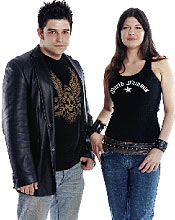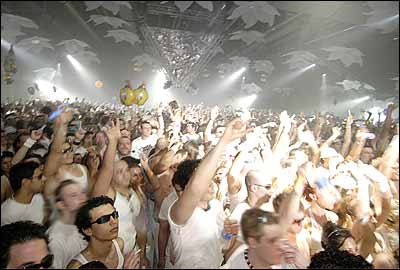The Club Kids

When Mat Vlasic, a finance coordinator at Epic Records, and Libby Hobday, a model and marketing guru for Vlasic’s new clothing line, met three years ago, “we were pretty wild—going out pretty much every night,” says Vlasic. Now they dine with the Strokes and Neil Young (Vlasic’s mom is a music-biz agent), and regularly take in shows at CBGB, the Knitting Factory, and Webster Hall. Though they don’t party as hard as they used to, they still crave the occasional epic bender, in New York and elsewhere. “Wherever the music’s good,” says Vlasic.
The Trip

My wife and I made our first trip to Montreal during the spring of 2003. The introduction of the smoking ban in New York and a blissful vacation to Berlin the previous summer had convinced us that nightclubbing could be more fun in cities that didn’t treat nightlife as a quality-of-life problem. Montreal’s proximity to New York—an hour-long flight, or a surprisingly unstressful six-hour drive through some of the prettier parts of upstate New York—sealed our decision.
I’ve gone back about once every six months since that first visit, and the place only gets cooler. The city’s fantastic hometown music scene has been enriched by top-notch European D.J.’s, many of whom, since the war in Iraq began, will only touch down in North America provided they’re on Canadian soil. New bars and clubs are opening with such frequency that even locals are having trouble keeping track, and the city’s once low-key loft parties (informal gigs held in vacant commercial and residential lofts) have become highly anticipated events well worth a pilgrimage. Mutek, the annual electronic-music festival founded in 2000, has brought an international cast of innovative artists like San Francisco duo Matmos (who played on Björk’s moving minimalist masterpiece, Vespertine), thus eclipsing much-better-known fests like Barcelona’s Sónar. But it’s the bands that have really put Montreal on the nightlife map. The city is producing one buzzed-about act after another—most notably the Arcade Fire, who count David Bowie and David Byrne among their fans, but also Les Georges Leningrad, the Dears, the Stills—all of which have caught fire among the indie cognoscenti in the U.S.
Montreal is a college town at heart (a founding member of the Arcade Fire attended McGill University), and Montreal clubland is relaxed and proudly nonexclusive. Velvet ropes are rare, bottle service rarer still, and a disarmingly friendly vibe permeates. And unlike techno-centric Berlin or garage-rock-dominated Detroit, Montreal has endlessly mutating subcultures, making it one of the most diverse music cities on the planet.
Smart up-and-coming Canadian alt-rock bands like Magneta Lane jockey for prime slots at the Casa del Popolo, which has the cramped, slightly scuzzy feel of Lower East Side rock clubs like Rothko. Popolo also hosts the city’s best weekly party, “We Sold Our Soul to Rock and Roll,” where D.J.’s spin everything from seventies stoner rock to eighties hardcore. Rockabilly and goth bands like Flesh Will Rock You put on highly theatrical shows at Foufounes Électriques. Williamsburg scenesters who preened and danced at Larry Tee’s Luxx events will want to seek out the roving late-night parties called“I Love Neon,” thrown by a collective of electronic-music aficionados. In Montreal’s northernmost Mile End neighborhood, a bar called L’ Hémisphère Gauche is fast becoming a premier hipster hangout, thanks to a booking policy that mixes out-of-town acts (Washington, D.C., rockers Dead Meadow) with hometown favorites like Sunday Sinners.
The collegiate overtones mean an abundance of record stores, many of which are stocked with great used vinyl and have an almost curatorial feel. Cheap Thrills features a huge selection of new and used hip-hop and psychedelia (the 13th Floor Elevators); one of the store’s clerks runs the great local label Alien8 Records (home to Les Georges Leningrad). CD Esoterik boasts the newest and best laptop techno (Four Tet), left-field music, and psych-folk (Gang Gang Dance).
If you’re awake and not out record shopping during the day, visit Notre Dame Basilica, a neo-Gothic cathedral whose domelike ceiling is as breathtaking as any in Europe, or the Musée d’Art Contemporain de Montréal, featuring traveling exhibitions from the likes of South African multimedia artist William Kentridge. Or just nap off the previous night’s damage in Mount Royal Park, Montreal’s Central Park.
The neighborhood called Plateau Mont-Royal, which abuts Mile End, is dotted with nightclubs and cafés, such as Laïka (a relaxed brunch-and-lunch spot by day, but by night a lounge where local D.J.’s play low-key sets right next to diners) and Thai joint Chuchai (a venerable vegetarian eatery with the most intense curries in Montreal). For late-night eats on the cheap, Montreal’s Chinatown is packed with restaurants like Pho Bang NY, serving up $4 bowls of noodles, and Lotte Furama, one of the city’s best dim-sum joints.
Club prowlers will want to stay in Old Montreal. At the new W Hotel, locals like Montreal Mirror “Disko Akimbo” columnist Raf Katigbak spin eighties hits right along with early-nineties rave in the hotel’s space-age bar. It seems everyone from touring bands to gay-circuit-party D.J.’s has been crashing here lately, but I like to stay at the Hotel Gault, housed in a gorgeous Beaux Arts building. The staff is surprisingly sympathetic to the needs of clubgoers: A concierge happily gave directions to an after-hours nightspot at the ungodly hour of 5 A.M., and the hotel pushes its breakfast cutoff time back to a luxurious 2 P.M. on weekends.
This year’s Mutek (June 1–6) will feature a rare North American appearance from Berlin techno star Ricardo Villalobos. For venue information for “I Love Neon” parties, go to iloveneon.ca. W Hotel (from $450; 514-395-3100); Hotel Gault (from $190; 514-904-1616).